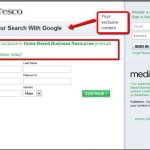Recently, Google has announced that it is taking a greater stance to control search results quality by providing better relevance, freshness and comprehensiveness. A stronger policy on websites that “copy” content is also in their menu and it does not stop there. Since more and more “autoblog” type websites are polluting the internet, so are the search results. These “autoblog” type websites benefit from “other people’s content” and most of them are using AdSense as their primary means of monetization. There are also several “AdSense Revenue Sharing” programs around and in accordance with this recent announcement, I believe that greater attention should be paid, if you are using Google AdSense as a means to making money online.
So What’s This AdSense Friendly Warning All About?
Google AdSense official blog made this announcement two days ago:
Fiction: I shouldn’t be held responsible if users post content on my site or network that violates AdSense policies.
Fact: You are responsible for ensuring that all of your content, including user-generated content such as forum posts, blog comments or outside feeds, is in compliance with AdSense policies (updated August 2010) on any page or site for which you’ve enabled AdSense ads.
As you probably know, the AdSense Network constantly reviews websites for content, to ensure that they are not only safe but equally relevant for all interested parties, these being, advertisers, users and publishers. Publishers expect the network to deliver only quality ads on their websites and on the other hand, Advertisers expect their ads to be published with the highest standards. An example given by Google is an advertiser trying to market “baby” products. Can you imagine if their ads appear next to websites where violent or inappropriate content are published? Not cool! This example, maybe, is just very close to being a reality and I believe that this is the reason why, among other things, a “stronger stance” is being sent out.
Now here is the important part and pay attention to this:
Making sure content complies with our policies can be complex when factoring in user-generated content. Keeping tabs on the hundreds (or even thousands!) of videos, blog posts, photos, tweets, and comments that can come in every day is a massive undertaking. However, you are ultimately responsible for all sites on which you have placed your ad code, regardless of whether you own or have produced the content…..
….We know how hard you work to make sure that your sites are of the highest quality and free of adult content, unoriginal content, or anything else that may violate policies and we thank you for your efforts. When advertisers, publishers, and users know they can trust the integrity of our advertising environment, everyone wins.
So what does this really mean? Notice the bolded words up there? I can give you one example right now. Say you have joined a network where they share a revenue with you in exchange for something (membership, article submission, photos, file sharing, etc.). That website allows you to put your own AdSense codes, and so, you get all excited and do it with the hopes of increasing your AdSense revenue potential. Say for some reason, that website gets flagged for content violation from Google AdSense and gets into trouble. The way I read this, is that you are now equally in trouble and will most likely get notified to take action on it (yeah, Google will give you a head start and slam the doors on you if you don’t do anything).
Another example. You are a “young” and “inexperienced” blogger and eager to get noticed. You ask for people to guest post for you. You announce on your blog that you are now open for guest posts and suddenly you get a “tidal wave” of guest, sending you articles. You read it, liked it and bam, you publish it. Now, the big question. Was that article original? Did you even bother to look? Was it from a reputable blogger? Might it be violating any copyright issues? That content is now on your website and running the risk of being “captured” by Google and considered as an unoriginal content publisher (this must be hard for auto bloggers, lol), or “something” that is not in compliance with their policies. You are now or your way to getting your AdSense account disabled.
Anyway, I can think of a lot of other examples, but the general idea here is for you to know that the AdSense Network, along with Google’s Affiliate Network, is on to a much stronger policy compliance than ever before. This is just to let you know that you should use greater care before handing over your AdSense code or as the example above, verify content for possible “duplicity”. Keep it safe, and if it is still unclear for you, here are some additional tips to get your AdSense account banned very quickly :).
So, do you think I am interpreting this “warning” correctly? Do you have different views? Let’s discuss them, this can be an important debate.
To your success!








Comments are closed.